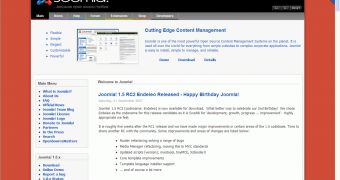The Content Management Systems (CMS) are widely used on the Internet. They separate the content creation from the site design. Users without having web design or programming knowledge can create a professional website using a ready-made application that allows them to concentrate only over the content creation. A site powered by a CMS is called a dynamic website, because its content (text, images, animations) could respond in various ways to the visitors' requests.
The dynamic content is created using client site programming (javascript for example) or server side programming (ASP, PHP). Static websites are made only from HTML files. In order to modify them you must edit one by one. Usually CMS are database driven. The visitors will look at the frontend, which is the final website displaying your content, while the backend allows you to manage the content that is stored in a database.
Dynamic sites are easy to update and maintain. When you deal only with static html pages, the updating process could take hours, while the use of a CMS will simplify the content editing process. This is performed from an administration panel through a simple browser based interface. Another advantage of CMS is the increased interactivity and functionality of your website. Most of CMS have lots of modules that allow you to enhance your website in minutes, website development being faster as compared to creation of static html files.
For example you can have a news publishing system, a forum, a blog and an image gallery on the same website due to the CMS modularity. The disadvantages of CMS over static websites (formed only by HTML pages): low pages loading speed on client side due to multiple database requests and the SEO (search engine optimization) process is not always optimal due to the web addresses format, because the pages address names are dynamically generated.
These impediments can be eliminated by optimizing CMS using PHP cache optimizers and short URL's names generators. The best practice is to carefully decide when a CMS is necessary, depending of the website size, the time interval when the content is updated and the webhosting services details.

 14 DAY TRIAL //
14 DAY TRIAL //